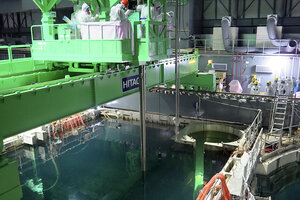Fukushima study emphasizes unthinkable US nuclear disasters
A Fukushima study released Thursday advises the US nuclear industry to protect against highly unlikely but worst-case scenarios. Earthquakes, floods, tsunamis, and solar storms are among the unusual events studied by the National Academy of Sciences in its Fukushima study.

Workers try to remove radioactive fuel rods from the Unit 4 building at the crippled Fukushima Dai-ichi nuclear power plant in Okuma, Fukushima Prefecture, northeastern Japan. A new Fukushima study warns of potential unthinkable nuclear disasters in the US.
Tokyo Electric Power Co./AP/File
WASHINGTON
A U.S. science advisory report says Japan's Fukushima nuclear accident offers a key lesson to the nation's nuclear industry: Focus more on the highly unlikely but worst case scenarios.
That means thinking about earthquakes, floods, tsunamis, solar storms, multiple failures and situations that seem freakishly unusual, according to Thursday's National Academy of Sciences report. Those kinds of things triggered the world's three major nuclear accidents.
"We need to do a soul searching when it comes to the assumptions" of how to deal with worst case events, said University of Southern California engineering professor Najmedin Meshkati, the panel's technical adviser. Engineers should "think about something that could happen once every, perhaps 1,000 years" but that's not really part of their training or nature, he said.
"You have to totally change your mode of thinking because complacency and hubris is the worst enemy to nuclear safety," Meshkati said in an interview.
The report said the 2011 Japanese accident, caused by an earthquake and tsunami, should not have been a surprise. The report says another Japanese nuclear power plant also hit by the tsunami was closer to the quake's fault. But the Onagawa plant wasn't damaged because quakes and flooding were considered when it was built.
Onagawa had crucial backup electricity available for when the main power went down, as opposed to Fukushima which had emergency generators in a basement that flooded. Onagawa's operators had "a different mindset" than the executives who ran Fukushima, Meshkati said.
The other two nuclear accidents — at Pennsylvania's Three Mile Island and Ukraine's Chernobyl— were caused by multiple system failures.
Lee Clarke, a Rutgers University risk expert and author of the book "Worst Cases," criticized the academy's report as too weak. He said the tone of the report made it seem like the accident was unpredictable and caught reasonable people by surprise "and it shouldn't have." But the report itself said the "the Fukushima accident was not a technical surprise."
David Lochbaum of the activist group Union of Concerned Scientists said the problem is that federal law financially protects the U.S. nuclear industry from accidents gives utilities little incentive to spend money on low-probability, high-consequence problems.
But Nuclear Energy Institute senior vice president Anthony Pietrangelo said the American nuclear industry has already taken several steps to shore up backup power and deal with natural disasters.
"We cannot let such an accident happen here," he said in a statement.
Another issue the report raised was about how far radiation may go in a worst case accident.
The U.S. Nuclear Regulatory Commission orders plants to have emergency plans for a zone of 10 miles around a nuclear plant. But the academy study said Fukushima showed that "may prove inadequate" if a similar accident happened in the U.S. People nearly 19 miles away in Japan needed protection from radiation. But the committee would not say what would be a good emergency zone.

